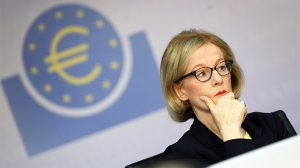Danièle Nouy: Getting Tough with Bankers

Danièle Nouy: Chair of the Supervisory Board at the European Central Bank. Daniel Roland | AFP | Getty Images
It is her job to keep Europe’s banks on the straight and narrow and remind their executives that honesty pays. During her four years as chairperson of the European Central Bank’s (ECB) supervisory board, Danièle Nouy made few friends in the financial world: as a strict principal she showed no tolerance whatsoever for the follies some bankers engage in when challenged by circumstance.
Earlier this year, Irish bankers found out that Nouy does not favour polite conversation when discussing their plight. She bluntly told them, on RTÉ national television, that they “do not deserve” any bonuses until Ireland’s banks have fully cleared up the mess left in the wake of the financial crisis. Reminding the bankers that they still have plenty of work to do on their bloated balance sheets, she wondered aloud if this was the right time to discuss bonuses. To make her position abundantly clear, she added: “Definitely not, in my view.”
Troubled banks – those perilously close to needing ECB life support – are required to apply to the ECB for permission to top-up their executives’ salaries or pay dividends to shareholders. Nouy takes a dim view on banks that “sort-of” address their issues in order to quickly revert to their old ways. She routinely rejects such requests.
Nouy is the architect of the ECB’s single supervisory mechanism (SSM), the first building block of the banking union to provide added resilience to the eurozone. In November 2014, the SSM took over the role of national entities in monitoring the financial stability of banks in all eurozone member states. Initially, the SSM suffered from a number of deficiencies which came to light during the first stress-test it jointly organised with the European Banking Authority. The remedies imposed on a few weak Italian banks ultimately proved too lenient, and insufficient to ensure their survival under adverse market conditions.
“Nouy is the architect of the ECB’s single supervisory mechanism (SSM).”
Nouy learned from her faux pas and has since shown no mercy to banks that fail to meet the tightened capital adequacy requirements. She also helped establish the ECB’s reputation for toughness, particularly when it comes to dealing with financial institutions that keep non-performing loans (NPL) lingering on their balance sheets. Nouy repeatedly clashed with national regulators – often still a bit resentful for having lost a considerable chunk of their heft to the ECB – as she forced banks to disclose and address the full extent of bad loans. She also got her way in Italy, and forcefully convinced banks to significantly reduce their NPL portfolios.
Following that, Nouy launched a broad investigation into the more esoteric parts of banks’ balance sheets, such as the size and quality of Level 2 and Level 3 assets, which may roughly be defined as illiquid instruments that are not usually traded and can therefore not be readily or objectively valued. The programme aims to stop banks from overstating the value – and understating the risk – of these assets.
Nouy is particularly well equipped to detect and expose flaws in Europe’s banking system; she’s been inspecting banks for over 40 years, first at the Banque de France and later at the French Prudential Supervision and Resolution Authority, which she headed between 2010 and 2013, before being invited to join Mario Draghi’s executive team at the ECB.
As Nouy’s five-year term draws to a close, the race is on the find a worthy successor who can expand the role of the single supervisory mechanism she helped to build. The prime contender for the job – also possibly the only one to have submitted an application (the ECB has so far failed to publish a shortlist of candidates) – is Sharon Donnery, deputy governor of the Central Bank of Ireland.
The first order of business awaiting Nouy’s replacement is to deal with the sudden influx of a considerable number of larger investment banks that are preparing to up-stakes in London and descend in the eurozone after the UK exits the European Union. Ultimately, however, the choice of a successor is likely to be gender-inspired. The ECB’s governing council is known to favour female candidates to address its gender imbalance at the top. This helps explain why three male candidates informally suggested by Italy have declined to submit their applications.
After stepping down from her job on December 31, Danièle Nouy will retire from public life. Her boss, ECB president Mario Draghi, has another year to go before his non-renewable eight-year term expires. Draghi will hand over the reins to the ECB in October 2019.
You may have an interest in also reading…
Sir Alex Ferguson: The Formula of Success as Told by an Endearing Control-Freak
Becoming the most successful and admired manager in the history of British football is no mean feat by any standard.
Mehriban Aliyeva – With Azerbaijan at Heart: the First Lady Reaches Out For a Better World
When Azerbaijan first lady Mehriban Aliyeva travels internationally, minds, people and hearts come together – East and West meet –
Ross Jackson: Eurozone – The End Game
It has become clear to most EU citizens, but not yet to the EU leaders, that neoliberal economics has been


















































































